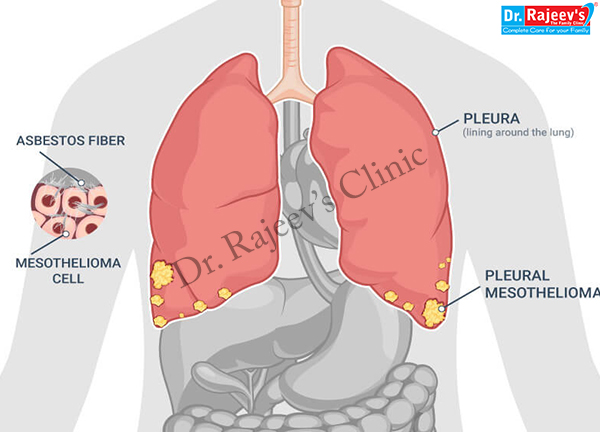

Mesothelioma is a type of cancer that develops in the lining that covers the outer surface of some of the body's organs. It's usually linked to asbestos exposure.
Mesothelioma mainly affects the lining of the lungs (pleural mesothelioma), although it can also affect the lining of the tummy (peritoneal mesothelioma), heart or testicles.
More than 2,600 people are diagnosed with the condition each year in the UK. Most cases are diagnosed in people aged 60-80 and men are affected more commonly than women.
Unfortunately, it's rarely possible to cure mesothelioma, although treatment can help control the symptoms.

The symptoms of mesothelioma tend to develop gradually over time. They typically don't appear until several decades after exposure to asbestos.
Symptoms of mesothelioma in the lining of the lungs include:
Symptoms of mesothelioma in the lining of the tummy include:
See your GP if you have any persistent or worrying symptoms. Tell them about any exposure to asbestos you may have had in the past.
Mesothelioma is almost always caused by exposure to asbestos, a group of minerals made of microscopic fibers that used to be widely used in construction.
These tiny fibers can easily get in the lungs, where they get stuck, damaging the lungs over time. It usually takes a while for this to cause any obvious problems, with mesothelioma typically developing more than 20 years after exposure to asbestos.
The use of asbestos was completely banned in 1999, so the risk of exposure is much lower nowadays. However, materials containing asbestos are still found in many older buildings.
Read more about asbestos and people at risk of exposure and avoiding exposure to asbestos.
HOW MESOTHELIOMA IS DIAGNOSED
If your GP suspects mesothelioma, they will refer you to a hospital specialist for some tests.
A number of different tests may need to be carried out, including:
These tests can help diagnose mesothelioma and show how far it has spread.
The best treatment for mesothelioma depends on several factors, including how far the cancer has spread and your general health.
As mesothelioma is often diagnosed at an advanced stage, treatment is usually focused on controlling the symptoms and prolonging life for as long as possible. This is known as palliative or supportive care.
Homeopathic therapies are different from conventional medicine in that the symptom or disease is treated. Homeopathy implements a wide range of methodologies in attempt to reestablish harmonic resonance in an individual. Essentially Homeopaths believe it is the person who can combat illness in the body and that everything else that can be added to the patient is merely an assist. For example, providing medicine to kill a cancerous tumor will not directly destroy the tumor, but the patient’s own immune-system will destroy the malignancy. Therefor the “whole person” needs to be treated or tuned in order to allow regeneration.
RL 16